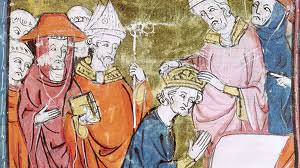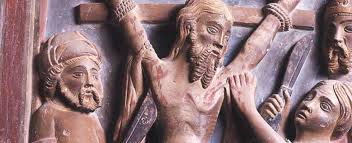Charting the “Rise of the West”: Manuscripts and Printed Books in Europe, A Long-Term Perspective from the Sixth through Eighteenth Centuries
These arguments suggest that the number of manuscripts and printed books produced in a given society are complex measures of economic performance and societal capabilities, and are therefore a valuable guide to the study of long-term economic change.
The Stirrup as a Revolutionary Device
A German legal historian, Paul Roth, published in 1850 a work that set out the basic concept of feudalism. According to Roth, Charles Martel had combined the two existing institutions of ‘vassalage’ and ‘benefice’—that is, a vassal swore allegiance to his lord in return for which he was given some kind of benefice, usually rent-free land.
Knowledge for Its Own Sake? A Practical Humanist in the Carolingian Age
Although recent studies have shed important light on the broader political and social context in which Lupus worked, this interesting figure’s literary activities continue to merit further examination within the cultural milieu of his own day
Sources of Spirituality in the Writings of Archbishop Hincmar of Reims
Archbishop Hincmar of Reims (845–882) was perhaps one of the most influential authors in Carolingian history. He donned the humble cloth of a monk only to transcend that humble destiny in his mission to bring spiritual perfection to an errant temporal sphere.
Boniface’s Booklife: How the Ragyndrudis Codex Came to be a Vita Bonifatii
The most recent addition to the family of literary genres may be the booklife. Finding its origin in Roland Barthes’s Roland Barthes and now taught in English departments, the booklife proposes a union of sorts of writing and living. Whether the genre will be long-lived is an open question, that it can be fruitful is not in doubt. But medievalists already knew that the dividing line between book and life is always thin, especially if that life has been lived in and among books.
The Rebirth of a Communications Network: Europe at the Time of the Carolingians
This paper attempts to explain the accelerated economic growth of medieval Europe by incorporating communications technologies in the analysis. During the reign of Charlemagne, written and spoken Latin was effectively standardized which reduced the cost of information storage relative to transmission.
Theological Works of the Venerable Bede and their Literary and Manuscript Presentation, with Special Reference to the Gospel Homilies
Bede’s theology is complex and closely interwoven; as we can observe, the different themes are interleaved within the homilies. Though Bede was profoundly influenced by Gregory, Augustine and the other Church Fathers, he combined their theologies in a new way that has had a lasting influence.
‘Viking Empires’? Scandinavian Kingship and the nature and orchestration of Viking raids, c.800-c.950
To what extent were Viking raids part of a more general process of expansion by Scandinavian rulers? Were the Franks simply receiving a taste of their own medicine in the ninth and tenth centuries?
Charters as weapons. On the role played by early medieval dispute records in the disputes they record
This paper seeks to shed more light on how written records were used during the Carolingian period by examining the role played by records of property disputes in the disputes they record.
In the Guise of a Christian: the Early Medieval Preliminary Stage of the Portrait Historie
A fine example of the belief in the existence of early portraits is the well-known gilt bronze Barbarossakopf in Cappenberg, Westphalia.
Sales, swindles and sanctions: Bishop Salla of Urgell and the counts of Catalonia
Salla moved in a world in which churchmen and lay magnates could be hard to distinguish. They did not just share families, and sometimes offices, but outlooks…
“What If … Charlemagne’s Other Sons had survived?” Charlemagne’s Sons and the Problems of Royal Succession
On January 28th 814, Charlemagne died at the age of 72. His son Louis the Pious succeeded his father into kingship and empire.
Hincmar and Anastasius: Lying, Treacherous Villains
Did Anastasius help kidnap and murder the wife and daughter of Pope Adrian II?
Poetry, Patronage, and Politics: Epic Saints’ Lives in Western Francia, 800-1000
t: Monastic authors in western Francia during the central Middle Ages composed and exchanged Latin verse saints’ lives (vitae metricae) to create communities of saints, emperors, bishops, teachers, and students
Unwilling Pilgrimage: Vikings, Relics, and the Politics of Exile during the Carolingian era
Unwilling Pilgrimage: Vikings, Relics, and the Politics of Exile during the Carolingian era By Daniel C. DeSelm PhD Dissertation, University of Michigan, 2009…
Volcanoes and the Climate Forcing of Carolingian Europe, A.D. 750–950
Revolutionary advances of the natural sciences will transform our understanding of the human past. This case study supports that thesis by connecting new data arising from the last decade’s scientific work in palaeoclimatology with the history of the Carolingian empire.
Digging Ditches in Early Medieval Europe
Digging Ditches in Early Medieval Europe By Paolo Squatriti Past and Present, Vol.176:1 (2002) Introduction: In the Royal Frankish Annals the year 793…
Episcopacy and apostolic succession according to Hincmar of Reims
Episcopacy and apostolic succession according to Hincmar of Reims By George Tavard Theological Studies, Vol. 34 (1973) Introduction: Hincmar, a monk from the…
Viking Age Arms and Armor Originating in the Frankish Kingdom
In the examination of material remains, illustrations, and capitularies, the reason why Carolingian arms and armor were prized amongst the Viking nations can be ascertained and evidence found as to how the Vikings came to possess such valued items.
Germanic Women: Mundium and Property, 400-1000
Germanic Women: Mundium and Property, 400-1000 Dunn, Kimberlee Harper (University of North Texas) M.A. Thesis (Science), University of North Texas, August (2006) Abstract…
Warranty and good lordship in twelfth century England
Warranty and good lordship in twelfth century England Hyams, Paul (California Institute of Technology University of Oxford) California Institute of Technology, January (1986) Abstract Already…
Eleanor of Aquitaine and the Quarrel Over Medieval Women’s Power
Such periodization, splitting the Middle Ages at the eleventh century, right in the middle of a time of considerable change, is distorting to the more general history, but creates an even more distorting periodization in medieval women’s history.
Health Education through the Ages
I shall group my remarks around two questions: whose was the task to educate, and who was to be educated?
Lex Salica and the Carolingian ‘Frankish’ Past
Lex Salica and the Carolingian ‘Frankish’ Past Turnbull, Anna Revealing Records II Conference, King’s College London (2010) Abstract The year 751 is regarded…
Currency Change in Pre-millennial Catalonia: Coinage, Counts and Economics
Currency Change in Pre-millennial Catalonia: Coinage, Counts and Economics Jarrett, Jonathan Numismatic Chronicle, No.169 (2009) Abstract Barcelona in the late tenth century was on…







